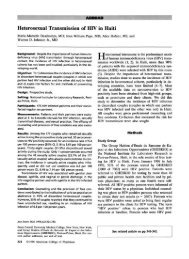Behavioural Surveillance Surveys - The Wisdom of Whores
Behavioural Surveillance Surveys - The Wisdom of Whores
Behavioural Surveillance Surveys - The Wisdom of Whores
You also want an ePaper? Increase the reach of your titles
YUMPU automatically turns print PDFs into web optimized ePapers that Google loves.
First, they are likely to want to use the<br />
data generated to support their own project<br />
evaluation efforts and to improve their<br />
prevention services. <strong>The</strong>y are therefore likely<br />
to have useful ideas about appropriate survey<br />
questions and indicators. Secondly, they are<br />
likely to have good access to communities that<br />
are otherwise difficult to reach. <strong>The</strong> trust that<br />
they have established with these communities<br />
provides a platform from which successful<br />
behavioral surveys can be launched. NGOs<br />
providing services to communities at risk for<br />
HIV may therefore become a primary partner<br />
(or the lead actor) in carrying out the surveys<br />
themselves.<br />
Communities at risk for HIV, and those that<br />
interact with them<br />
<strong>The</strong> full and active participation <strong>of</strong> all<br />
quarters <strong>of</strong> government and <strong>of</strong> non-governmental<br />
service providers will be <strong>of</strong> no value<br />
unless the communities at risk for HIV are<br />
themselves willing to participate in behavioral<br />
surveillance. And people are only likely to<br />
be willing to participate if they believe that<br />
the exercise will benefit them and their<br />
communities. <strong>The</strong> translation <strong>of</strong> data into<br />
better service provision is the weakest link<br />
in what should be a circular chain <strong>of</strong><br />
programming, surveillance, evaluation and<br />
improved programming. Often, people are<br />
right to be wary <strong>of</strong> vague promises that a<br />
survey will be followed by improved<br />
programming. This is one <strong>of</strong> the reasons that<br />
it is so critically important to plan realistically<br />
how data will be used before the survey<br />
process begins.<br />
<strong>The</strong> provision <strong>of</strong> information and service<br />
is an important part <strong>of</strong> HIV prevention<br />
programming, but it is up to members <strong>of</strong> the<br />
communities themselves to use those services<br />
to reduce their exposure to HIV, and that <strong>of</strong><br />
their partners. <strong>The</strong>y know better than anyone<br />
what the current pr<strong>of</strong>ile <strong>of</strong> risk behavior is.<br />
<strong>The</strong> more BSS answers questions raised within<br />
the community itself, the more community<br />
members are likely to act on the information it<br />
generates. It is therefore important to consult<br />
with members <strong>of</strong> the communities who will be<br />
answering questionnaires about what should<br />
be included in the survey.<br />
Like the NGOs that serve them, community<br />
members know the ins and outs <strong>of</strong> the world<br />
they inhabit. Key individuals can provide<br />
essential information, helping to delineate the<br />
community and to facilitate access to its<br />
members. Community members can also shed<br />
light on the power structures that operate<br />
within a community. For BSS to succeed,<br />
those planning the data collection have to deal<br />
not only with individuals at high risk for HIV,<br />
but also with the men, women and organizations<br />
that hold the keys to their community.<br />
<strong>The</strong>se people - be they brothel owners and<br />
pimps, drug dealers and shooting gallery<br />
owners, taxi company bosses, union leaders or<br />
head teachers - may stand to gain or to lose<br />
from a better understanding <strong>of</strong> risk behavior<br />
in the communities they influence, and from<br />
more effective prevention efforts in these<br />
communities. Certainly, they can stand in the<br />
way <strong>of</strong> a successful data collection exercise.<br />
One <strong>of</strong> the jobs <strong>of</strong> those planning BSS is<br />
to consult key power brokers about their<br />
concerns, and to clarify the benefits that better<br />
HIV prevention efforts can bring to them and<br />
to the communities they influence.<br />
B EHAV I OR A L S U R V EI L L A NC E SURV EY S CHAPTER 2<br />
13










